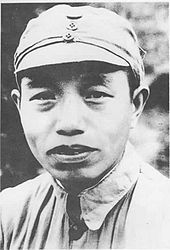You can help expand this article with text translated from the corresponding article in Chinese. (March 2023) Click for important translation instructions.
|

Tan Zhenlin (simplified Chinese: 谭震林; traditional Chinese: 譚震林; pinyin: Tán Zhènlín; 24 April 1902 – 30 September 1983) was a political commissar in the People's Liberation Army during the Chinese Civil War, and a politician after the establishment of the People's Republic of China.
Tan Zhenlin was born in You County, Hunan. He joined the Chinese Communist Party in 1926, and participated in the Chinese Civil War since the Jinggang Mountains rebellion in the early days of the war. By 1949 he rose to the first deputy political commissar of the Third Field Army of the PLA.
After the founding of the People's Republic in 1949, Tan became the Party Secretary and Governor of Zhejiang. He served as the Third Secretary of the Communist Party's East China Bureau, then Chairman of Jiangsu Provincial People's Government. In December 1954 Tan became the party's deputy Secretary-General (not to be confused with General Secretary), and later Vice Premier. During the Great Leap Forward, Tan became a Secretary of the Secretariat, in charge of agriculture. He supported Mao's policies during the Great Leap, which he regretted later in life. In 1967 he was quoted in Chinese press disputing to the concept of a unified Chinese cuisine: "In fact, in relation to some dishes regarded as delicacies in the South, many people in other parts of China share the disgust felt by Europeans" (referring to monkey brains).
Tan became a central figure opposed to the Central Cultural Revolution Group (CCRG) in the early stages of the Cultural Revolution. Tan, along with other Communist revolutionaries such as Chen Yi and Nie Rongzhen, openly attacked the CCRG and their insistence on expanding the Cultural Revolution. Tan bluntly told the assembled leaders that the Cultural Revolution was an attempt to purge the Communist old guard. Tan also reputedly said, referring to Jiang Qing after Xie Fuzhi told him that Jiang would protect him, "I don't want her protection. I work for the party, not her. Had I known it would come to this, I should not have lived to this day. I should have never joined the revolution with Mao. I should have never joined the Communist Party. Even if I am executed, imprisoned, or expelled from the party, I will fight this to the end." He was denounced as part of the February Countercurrent and required to take a leave of absence to conduct self-criticism. However, after Lin Biao's own demise in 1971, Mao attempted to reach out to his old revolutionary colleagues, and restored Tan's political standing. In 1975 Tan was named a vice-chairman of the National People's Congress.
Tan Zhenlin was a member of the 8th Politburo of the Chinese Communist Party. He was a member of the 8th (1956–1969), 10th (1973–1977), and 11th (1977–1982) Central Committees of the Communist Party. He served as the vice-chairman of the 4th and 5th Standing Committee of the National People's Congress (1975–1978, 1978–1983).
References
- Tan Zhenlin
- Hillman, T. The Land of Five Flavors
- "1967年谭震林当面反驳毛泽东:不该跟你干革命". Ifeng.
- Hou, Li (2021). Building for Oil: Daqing and the Formation of the Chinese Socialist State. Harvard-Yenching Institute monograph series. Cambridge, Massachusetts: Harvard University Asia Center. ISBN 978-0-674-26022-1.
- Tan Zhenlin
| Vice chairpersons of the Standing Committee of the National People's Congress | |
|---|---|
| 1st (1954–1959) | |
| 2nd (1959–1964) |
|
| 3rd (1964–1975) | |
| 4th (1975–1978) | |
| 5th (1978–1983) |
|
| 6th (1983–1988) | |
| 7th (1988–1993) | |
| 8th (1993–1998) | |
| 9th (1998–2003) | |
| 10th (2003–2008) | |
| 11th (2008–2013) | |
| 12th (2013–2018) | |
| 13th (2018–2023) | |
| 14th (2023–2028) | |
| Political leaders of Jiangsu since 1949 | |
|---|---|
| Party committee secretaries | |
| Congress chairpersons | |
| Governors | |
| Conference chairpersons | |
| Political leaders of Zhejiang since 1949 | |
|---|---|
| Party committee secretaries | |
| Congress chairpersons | |
| Governors | |
| Conference chairpersons | |
| Supervisory directors | |
| Cultural Revolution | |
|---|---|
| Prelude | |
| Major events |
|
| Massacres | |
| Key figures |
|
| Documents | |
| Concepts |
|
| Groups |
|
| Related topics | |
- 1902 births
- 1983 deaths
- Chinese Communist Party politicians from Hunan
- Governors of Zhejiang
- Governors of Jiangsu
- Members of the Secretariat of the Chinese Communist Party
- People's Republic of China politicians from Hunan
- Mayors of Hangzhou
- Politicians from Zhuzhou
- Members of the 8th Politburo of the Chinese Communist Party
- Vice Chairpersons of the National People's Congress
- Burials at Babaoshan Revolutionary Cemetery